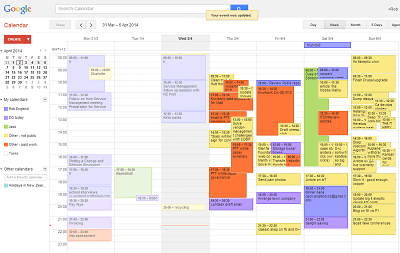Do you need to stop procrastinating NOW?
Are you panicking over a looming deadline, but you somehow can’t bring yourself to focus and stop checking your emails?
If so, you are not alone. Everyone has this problem sometimes.
The following steps will help you to re-focus.
How to stop procrastinating – quickly
- STOP. What are your top three jobs today? Is this one of them?
- If NO, don’t do it. Start the top job. Your procrastination instinct was correct.
- If YES, use your diary. Break the job into tiny pieces. The first piece is “get out the things I need for that job” – your file, notes, a letter, whatever it might be.
This is an easy, non-scary way to make a start.
Allow a block of time for it, 15 or 30 mins. Book that chunk of time into your diary as an appointment.
Also put your other top jobs into the diary, allowing 30 mins each. Allow a quarter of an hour between them. - Put into your diary “tidy my desk/office” for 30 mins starting at the most recent quarter-hour. (If in doubt, tidy up.)
- Get on with tidying up. Finish 5 mins early. Make a nice cup of tea.
- Start the first job ON TIME. Stop ON TIME (you won’t have finished it, it doesn’t matter).
Make a cup of tea during your 15 min break, or take a breath of fresh air. - And so on.
- Start the next work session ON TIME. And so on.
Why this works
Tidying up your work area is always a good idea. (If in doubt, tidy up). It’s a useful job that clears the mind, organises your physical environment and allows you to feel productive.
By putting it in your diary, you feel that you are progressing through your day’s work. It is a good start.

Assigning half-hour chunks of time to jobs means that each work session is limited and productive. You have a realistic and achievable goal: simply to spend that time working on a particular job. You also have a deadline to stop working. The result is usually more effective work.
Finishing your tasks a few minutes early and starting the next one on time keeps you on track and makes you feel organised. It develops the valuable habit of punctuality and respecting your own diary.

Scheduling breaks between work sessions is realistic: you are going to take breaks anyway, so take a grip of them by putting them in your diary. Plan to succeed and stay ahead of schedule. Failing to plan = planning to fail.
Follow these steps, and you will be surprised how much you get done. You might even start to feel enthusiastic about your work as you begin to make solid progress, and realise it was not as daunting as you thought.
Find out WHY we procrastinate by reading this Note: On Procrastination


